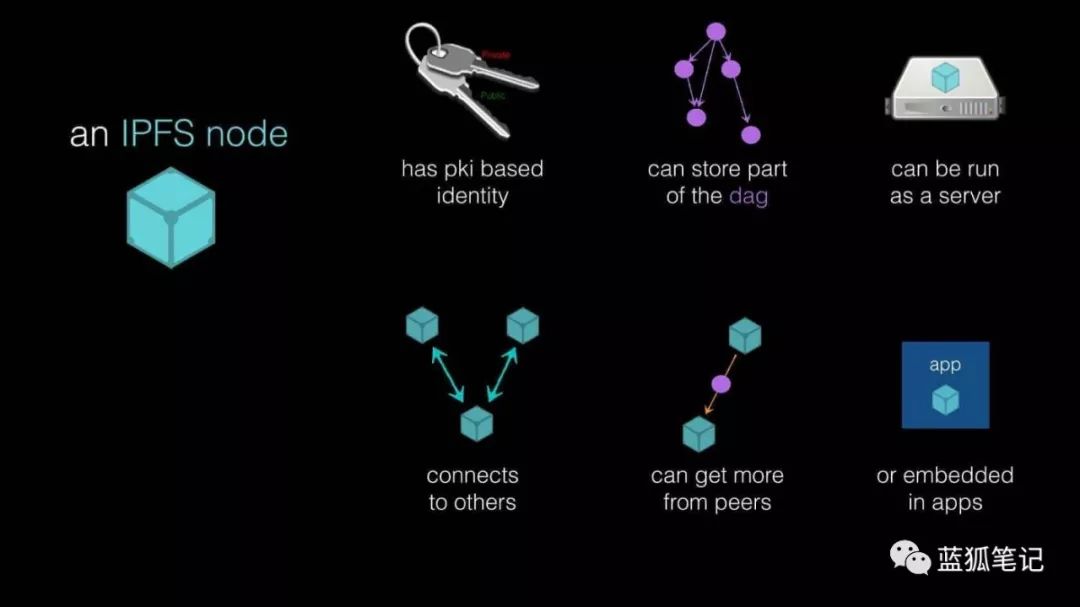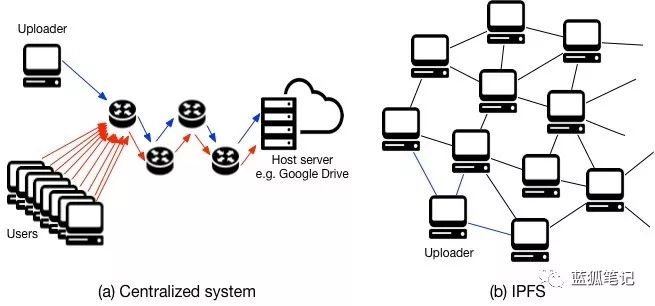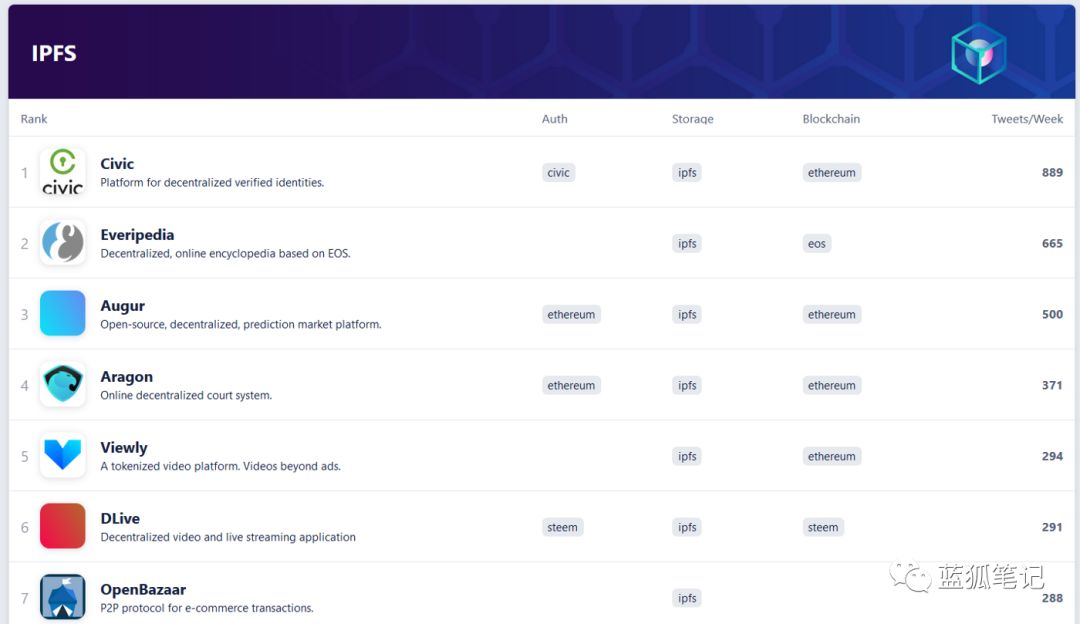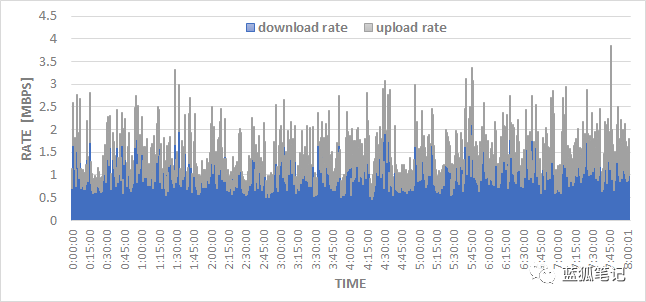Why is IPFS interesting?
Foreword: There have been many readers of Blue Fox notes who mentioned that they want to understand IPFS. This article briefly introduces what IPFS can bring to the blockchain and the future network world, and also explains its current challenges. The author of this article is Rakesh Kumar, the original titled "IPFS: Integrity Analysis of Distributed Networks", translated by the Blue Fox Note Group "Lu".

In this comprehensive analysis, we will discuss IPFS (Interstellar File System). This article explains several reasons why IPFS has caught our attention, as well as some areas where IPFS is expected to land but still need to be developed.
In this analysis, we first outline the IPFS and explain the main motivation behind it to help readers better understand that IPFS can solve the major problems in the Internet today. Next, we will briefly introduce the technical design principles of IPFS. Our goal is to help readers understand the different distributed systems that are inspired by IPFS and how to extend them to achieve a single and powerful unified system.
- Segwit is about 2 years old, what impact does it have on Bitcoin?
- More than 100 million yuan out of funds! BitMEX was investigated and users were anxious
- QKL123 market analysis | Global interest rate cuts expected to strengthen, is expected to regain lost ground in the short term (0722)
Next, we do our own analysis of the network state, which explains the current cost of running IPFS and the benefits it brings to the network. For the sake of completeness, we also outline some of the existing challenges and possible countermeasures.
Finally, we introduced some applications running on IPFS and discussed how to create new business models.
Why is IPFS interesting?
IPFS is an important step in the innovation of the previous generation of technology
IPFS has gained a lot from previous technologies such as distributed hash tables (DHT), BitTorrent, git and SFS. Inspired by these technologies, IPFS provides an enhanced version of the solution for hypermedia data sharing. IPFS is an open source project that embraces global research and development contributions and continually enhances the system.

(IPFS Vs centralized data movement in "client-server" mode)
IPFS is an important part of the Web 3.0 infrastructure
The long-term goal of Web 3.0 is to replace the current Internet infrastructure. Decentralization is the essence of Web 3.0. Many people think that distributed ledger technology (DLT) (such as blockchain) is the core building block of Web 3.0.
A blockchain is an unalterable, and only incremental, distributed ledger technology that stores network state. A consensus needs to be reached between all distributed network nodes in order to extend the blockchain and store important network data in the network nodes.
Therefore, the cost of storing any other type of data into the blockchain can be very high. For multiple use cases, it may be more efficient to store other non-critical data in a manner that is close to the blockchain security level.
IPFS is the most suitable storage medium for such data. IPFS allows data to be stored in a distributed manner, and data cannot be altered and falsified. If you do not change the data identifier, you cannot change the data stored on the IPFS network. In IPFS, an identifier is a cryptographic hash of data. This means that non-critical data can be stored to IPFS while this identifier is stored on the underlying distributed ledger. This results in less consumable operations on the distributed ledger.
IPFS is the best storage platform for decentralized applications
Decentralized applications (dApps) are a type of application that takes advantage of decentralization to gain unprecedented benefits. For example, centralized exchanges are transformed into decentralized exchanges, thereby eliminating or reducing transaction costs. For example, decentralized social media and video platforms, published content will not be reviewed according to the wishes of the operating company. Such a dApp needs to store a large amount of data. IPFS allows for the storage of such data in a distributed manner, which is anti-review capability. For these reasons, IPFS is becoming the preferred storage platform for dApp.
 (App.co indicates that the number of dApps using IPFS as a storage platform continues to rise)
(App.co indicates that the number of dApps using IPFS as a storage platform continues to rise)
IPFS can provide a better user experience
IPFS can improve the user experience in many situations. For example, browsing or downloading certain hot content using traditional "client-server" mode can drain network bandwidth and cause network congestion. Due to the long delay, the user experience is not good.
In IPFS, content is delivered from the nearest peer node with a copy of the content, eliminating single-node stress and improving the user experience. In addition, IPFS provides continuous and smooth content for browsing even if the original content is no longer accessible.
IPFS supports new network business models
In today's Internet world, any web content needs to be stored on a dedicated server. Content publishers must ensure the availability of content and sufficient bandwidth to meet user needs. IPFS has fundamentally changed this model.
In IPFS, data is not served to all users as a single server, but is stored in a distributed manner and can be served by any node that owns the data. As a result, the bandwidth requirements are significantly reduced and their reliability is improved.
In other words, the new business model will begin to develop. For example, for projects like Filecoin, content publishers can pay small rewards to node users to store content. This will improve the distribution mechanism of the content and ensure the validity of the content.
 (Many video sharing platforms, social media and other applications are turning to IPFS for a better user experience and business model.)
(Many video sharing platforms, social media and other applications are turning to IPFS for a better user experience and business model.)
IPFS is gradually being adopted by the mainstream
Due to the multiple nature of IPFS, it is gradually being adopted by the mainstream. In our report, we discussed IPFS to help mainstream users in Turkey and Spain respond to the review. In addition to the recent Cloudflare announcement, sites can now be hosted on IPFS and pointed to using a simple, fully qualified domain name.
IPFS-hosted websites can handle the review, and now they can easily identify and securely browse them via HTTP and HTTPS and Cloudflare's IPFS gateway.
In addition, Cloudflare has implemented certain technologies to ensure that users do not need to trust Cloudflare to provide them with the correct content they require.
What are the challenges for IPFS?
IPFS is a new technology that is constantly evolving. However, we also understand that there are still some challenges to overcome in order to achieve large-scale adoption of IPFS.
Bandwidth requirement
Currently, running IPFS nodes requires a lot of bandwidth, which is not feasible for many users, especially in developing countries. Excessive use of bandwidth can affect the adoption of IPFS in many parts of the world. There are many suggestions on how to deal with this issue, and providing economic incentives may be the right direction. The financial rewards of hosting content on IPFS can be used to pay for node operating costs and encourage everyone to use IPFS.

(The figure shows the bandwidth usage of the IPFS node beta. In this test, the node was not used to browse or download any IPFS content. However, within 8 hours, our node has downloaded/uploaded more than 5GB of data. )
Availability
The current implementation of IPFS does not ensure the availability of data at the time of the request. One way to ensure its availability is to pinpoint the content, which requires a constant copy of the published content on the IPFS node. This IPFS node must always be online to ensure its validity. Projects like Filecoin are building an incentive layer that encourages nodes to save content in exchange for rewards.
Private content
Content posted to IPFS is set to public information. Anyone with a content hash can access this content. Currently, IPFS does not provide a built-in solution for storing private data.
Encryption technology can store and transmit private data over IPFS. Another more complicated approach is to create a private network using the IPFS protocol, where nodes can only connect to nodes on a specific list of private networks.
in conclusion
In this summary, we discuss why we believe IPFS is a key technology for future distributed Internet. Detailed analysis reports include more information about IPFS technology, security, network dynamics, and different application scenarios. Overall, IPFS has proven to be a critical technology for distributed data storage and response review. With subsequent development, it can become the standard protocol for future data transmission.
——
Risk Warning: All articles in Blue Fox Notes do not constitute investment recommendations . Investment is risky . Investment should consider individual risk tolerance . It is recommended to conduct in-depth inspections of the project and carefully make your own investment decisions.
We will continue to update Blocking; if you have any questions or suggestions, please contact us!
Was this article helpful?
93 out of 132 found this helpful
Related articles
- Once the old coin of the coin circle: the "old" project and the "new" idea of the quantum chain
- Liu Chang with: the beginning and end of the expansion of Bitcoin
- Bitcoin active address number fell to its lowest level since April
- Blockchain Weekly | BTC rose 20%: Is it a rebound or an aerial refueling?
- With $73 million in bitcoin outflows, is Bitmex a bull market "time bomb"?
- Gu Yanxi: Libra, a side attack on the securities industry
- Global blockchain investment trend report for 2019






